小学英语课堂中说话写话训练
小学生英语日常口语对话练习【三篇】
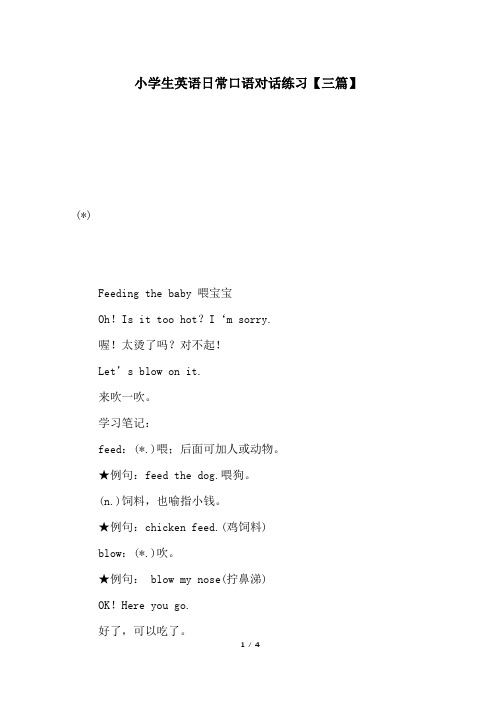
小学生英语日常口语对话练习【三篇】(*)Feeding the baby 喂宝宝Oh!Is it too hot?I‘m sorry.喔!太烫了吗?对不起!Let’s blow on it.来吹一吹。
学习笔记:feed:(*.)喂;后面可加人或动物。
★例句:feed the dog.喂狗。
(n.)饲料,也喻指小钱。
★例句:chicken feed.(鸡饲料)blow:(*.)吹。
★例句: blow my nose(拧鼻涕)OK!Here you go.好了,可以吃了。
Yummy!Yummy!Eat more!好吃喔!多吃一点。
学习笔记:more:(ad*.)更,更多。
★例句:Ha*e some more.多吃一点。
(adj.)更多的。
★例句:You should ha*e more meat.你应当多吃些肉。
(*)Don‘t go too far 不要走远Baby,where are you?宝宝,你在哪里?I’m cook ing supper here.我正在这里煮晚餐。
学习笔记:cook:(*.)烹调,煮。
★例句:cook a meal.做饭。
(n.)厨师。
★例句: He is a cook.他是个厨师。
Dining 吃饭No beans?不吃豆子?Beans make you strong.豆子会使你强壮喔。
学习笔记:strong:(adj.)坚强的,强壮的。
★例句:strong wind 大风。
(*)Concentrate on Eating 专心吃饭Stop horsing around!别再胡闹了!Don‘t be a picky eater.不要这么挑嘴!学习笔记:horse:(*.)骑马,捉弄。
★原文中的“horse around”指“哄闹,胡闹”。
(n.)马。
picky:(adj.)挑剔的,吹毛求疵的。
★例句:Don’t be so picky.不要这么挑剔。
Eat it up 吃干净Oh,no!You left a lot of food on your plate.喔!你剩下一大堆食物在盘子上.Eat it up!把它吃光.学习笔记:left:(*.)离开,遗留,“lea*e”的过去式。
小学英语教案:日常交际用语与对话训练
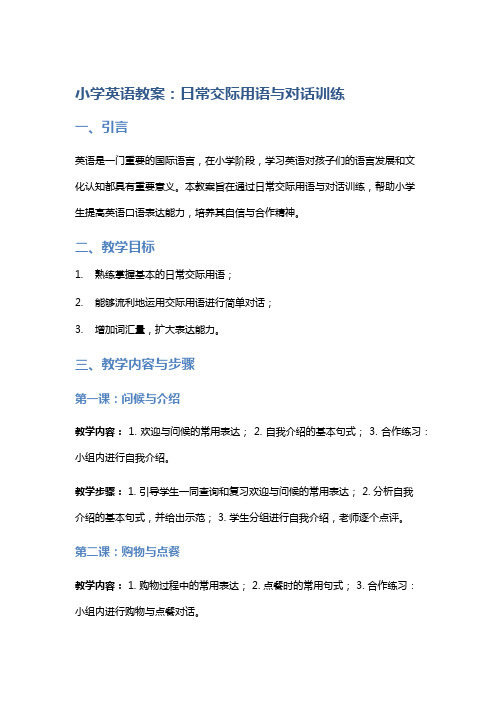
小学英语教案:日常交际用语与对话训练一、引言英语是一门重要的国际语言,在小学阶段,学习英语对孩子们的语言发展和文化认知都具有重要意义。
本教案旨在通过日常交际用语与对话训练,帮助小学生提高英语口语表达能力,培养其自信与合作精神。
二、教学目标1.熟练掌握基本的日常交际用语;2.能够流利地运用交际用语进行简单对话;3.增加词汇量,扩大表达能力。
三、教学内容与步骤第一课:问候与介绍教学内容: 1. 欢迎与问候的常用表达; 2. 自我介绍的基本句式; 3. 合作练习:小组内进行自我介绍。
教学步骤: 1. 引导学生一同查询和复习欢迎与问候的常用表达; 2. 分析自我介绍的基本句式,并给出示范; 3. 学生分组进行自我介绍,老师逐个点评。
第二课:购物与点餐教学内容: 1. 购物过程中的常用表达; 2. 点餐时的常用句式; 3. 合作练习:小组内进行购物与点餐对话。
教学步骤: 1. 给出购物场景,引导学生讨论购物过程中的常用表达; 2. 分析点餐时的常用句式,并给出示范; 3. 学生分组进行购物与点餐对话,老师逐个指导和纠正。
第三课:求助与感谢教学内容: 1. 求助他人时的常用表达; 2. 表达感谢的基本句式; 3. 合作练习:小组内进行求助与感谢对话。
教学步骤: 1. 创设情境,让学生掌握求助他人时的常用表达; 2. 分析表达感谢的基本句式,并给出示范; 3. 学生分组进行求助与感谢对话,老师逐个指导和纠正。
四、总结与评价通过以上教学内容和步骤,小学生将能够熟练掌握日常交际用语,并能够运用这些交际用语进行简单的对话。
这不仅有助于他们在英语学习中培养自信和合作能力,还能为将来的实际应用打下良好基础。
五、拓展与延伸为了进一步提升小学生的英语口语表达能力,可结合实际情境,设计更多涉及交际用语的练习活动。
比如角色扮演、口头描述物品等,通过创设真实场景进行练习,让学生在愉快的氛围中激发英语表达的兴趣和积极性。
以上是关于小学英语教案:日常交际用语与对话训练的内容编写,希望能够对您有所帮助。
小学生英语口语对话练习【三篇】
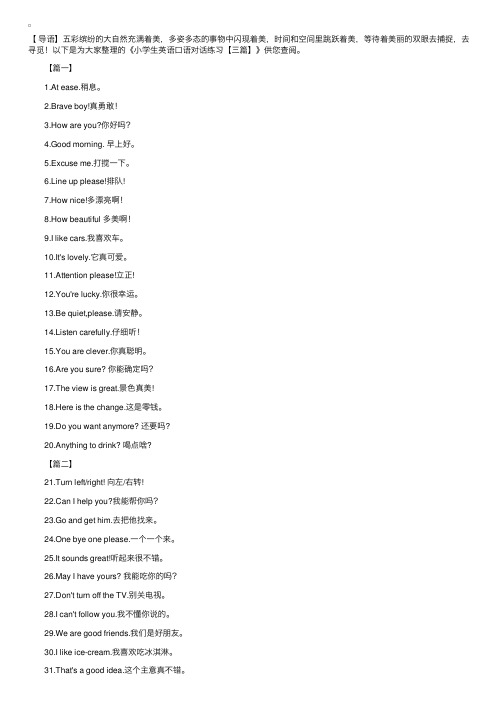
【导语】五彩缤纷的⼤⾃然充满着美,多姿多态的事物中闪现着美,时间和空间⾥跳跃着美,等待着美丽的双眼去捕捉,去寻觅!以下是为⼤家整理的《⼩学⽣英语⼝语对话练习【三篇】》供您查阅。
【篇⼀】 1.At ease.稍息。
2.Brave boy!真勇敢! 3.How are you?你好吗? 4.Good morning. 早上好。
5.Excuse me.打搅⼀下。
6.Line up please!排队! 7.How nice!多漂亮啊! 8.How beautiful 多美啊! 9.I like cars.我喜欢车。
10.It's lovely.它真可爱。
11.Attention please!⽴正! 12.You're lucky.你很幸运。
13.Be quiet,please.请安静。
14.Listen carefully.仔细听! 15.You are clever.你真聪明。
16.Are you sure? 你能确定吗? 17.The view is great.景⾊真美! 18.Here is the change.这是零钱。
19.Do you want anymore? 还要吗? 20.Anything to drink? 喝点啥?【篇⼆】 21.Turn left/right! 向左/右转! 22.Can I help you?我能帮你吗? 23.Go and get him.去把他找来。
24.One bye one please.⼀个⼀个来。
25.It sounds great!听起来很不错。
26.May I have yours? 我能吃你的吗? 27.Don't turn off the TV.别关电视。
28.I can't follow you.我不懂你说的。
29.We are good friends.我们是好朋友。
30.I like ice-cream.我喜欢吃冰淇淋。
小学5个英语对话作文
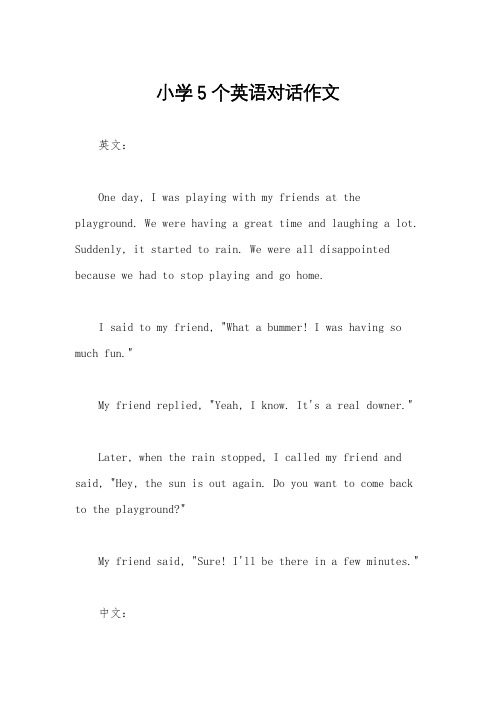
小学5个英语对话作文英文:One day, I was playing with my friends at the playground. We were having a great time and laughing a lot. Suddenly, it started to rain. We were all disappointed because we had to stop playing and go home.I said to my friend, "What a bummer! I was having so much fun."My friend replied, "Yeah, I know. It's a real downer."Later, when the rain stopped, I called my friend and said, "Hey, the sun is out again. Do you want to come back to the playground?"My friend said, "Sure! I'll be there in a few minutes."中文:有一天,我和朋友们在游乐场玩耍。
我们玩得很开心,笑声不断。
突然,天开始下雨了。
我们都很失望,因为不得不停止玩耍回家。
我对朋友说,“真讨厌!我玩得这么开心。
”。
朋友回答说,“是啊,我知道。
真是个扫兴。
”。
雨停后,我给朋友打电话说,“嘿,太阳又出来了。
你要不要回游乐场玩?”。
朋友说,“当然!我马上就到。
”。
一年级上英语选正确的句子填入对话

一年级上英语选正确的句子填入对话
当涉及到一年级英语的对话练习时,通常会涉及一些简单的句子,以帮助学生练习基本的语言表达能力。
以下是一些可能会出现在一年级英语课堂上的句子:
1. Hello, my name is Amy.
2. What's your favorite color?
3. I like to play with my friends.
4. This is my pet cat.
5. How are you today?
6. Can I have a cookie, please?
7. I want to go to the park.
8. It's raining outside today.
9. I have a big red ball.
10. Let's sing a song together.
以上句子涵盖了一些基本的日常用语和常见的情景对话,可以帮助学生练习简单的交流和表达能力。
在填入对话时,可以根据对话的情境和语境来选择合适的句子,以构建一个完整的对话。
希望这些句子能够帮助到你。
三年级英语口语锻炼5篇

三年级英语口语锻炼5篇第一篇:三年级英语口语锻炼三年级英语口语锻炼(1、2册)1、What’s your name?I’m Tony/Jenny/Gogo.2、What’s this?It’s a desk.3、Can you read? Yes, I can./No, I can’t.4、Who’s she? She’s my mother.5、Who’s he? He’s my friend.6、How are you? I’m fine, thanks.7、What’s her name?Her name’s Lisa.8、What’s his name?His name’s Lisa.9、Is this a panda? Yes, it is./No, it isn’t.10、What color is this? It’s orange.11、How old are you? I’m ten.12、How ole is he? He’s seven.13、How ole is she? She’s seven.14、What do you like?I like cheese.15、Do you like tennis? Yes, I do./ No, I don’t.16、Is that a black pillow? No, it isn’t.Is that a brown door? Yes, it is.17、What are these? They’re pears.18、Are these peaches? No, they aren’t.19、Are these grapes? Yes, they are.20、Where’s my skirt? It’s on the bed.21、Where are my socks? They’re under the pillow.22、What time is it? It’s eleven o’clock.23、Is it twelve o’clock? Yes, it is./ No, it isn’t.24、How many cherries are there? There are twenty.、Are there three peaches in the box? Yes, there are./ No, there aren’t.、Do you have plates?Yes, I do./ No, I don’t.27、Do you have spoons?Yes, we do./ No, we don’t.28、Does she have cups? Yes, she does./ No, she doesn’t.29、Does he have glasses? Yes, he does./No, he doesn’t.2526第二篇:如何锻炼英语口语如何锻炼英语口语很多人有个误解,认为只要托福、GRE考好了就行了。
小学一年级英语简单对话练习25题

小学一年级英语简单对话练习25题1. Hello! How are you? (你好!你怎么样?)2. Good morning! (早上好!)3. Hi! What's your name? (嗨!你叫什么名字?)4. Nice to meet you. (很高兴见到你。
)5. How old are you? (你几岁了?)6. What is this? It's a pen. (这是什么?这是一支钢笔。
)7. Look! That is a book. (看!那是一本书。
)8. Is this a ruler? Yes, it is. (这是一把尺子吗?是的,它是。
)9. This is a pencil. What color is it? (这是一支铅笔。
它是什么颜色的?)10. That isn't a bag. It's a schoolbag. (那不是一个包。
它是一个书包。
)11. Who is your father? (谁是你的爸爸?)12. Who is your mother? (谁是你的妈妈?)13. Can you say the name of your sister? (你能说出你姐姐的名字吗?)14. Who is your brother? (谁是你的哥哥?)15. Do you have a grandpa? (你有爷爷吗?)16. What animal has a long tail? (什么动物有长尾巴?)答案:The monkey has a long tail. (猴子有长尾巴。
)17. Which animal can run very fast? (哪种动物能跑得很快?)答案:The horse can run very fast. (马能跑得很快。
)18. What animal likes to eat carrots? (什么动物喜欢吃胡萝卜?)答案:The rabbit likes to eat carrots. (兔子喜欢吃胡萝卜。
译林版一年级英文对话专项练习(第一个月)

译yì林lín版bǎn一yī年nián级jí英yīng语yǔ对duì话huà专zhuān项xiàng练liàn习xí(第一个月)一yī、请qǐng在zài下xià面mian空kòng白bái处chù补bǔ上shàng正zhèng确què的de对duì话huà内nèi容róng。
(1)Yang Ling: Hi, Wang Bing.Wang Bing: ___________________. This is Wang Qi. She is my sister.Yang Ling: ____________________.Wang Qi: Hi, Yang Ling.(2)Liu Tao: Good morning, Miss Lee.Lee: ____________________. What's your name?Liu Tao: ___________________________________.(3)Lily: Hello Su Hai. This is Lucy. She is my sister.Su Hai: ________________________________.Lucy: Nice to meet you, too.Su Hai: Are you twins?Lily&Lucy: Yes, _______________.二èr、请qǐng将jiāng下xià列liè对duì话huà排pái序xù,成chéng为wéi一yí段duàn通tōng顺shùn的de对duì话huà。
少儿英语英语情景对话练习【五篇】

导语:孩⼦的英语启蒙教育从什么时候开始⽐较好呢?究竟怎么样的引导孩⼦去学习外语呢?整理了少⼉英语英语情景对话练习资料,欢迎阅读。
少⼉英语英语情景对话练习:我很赶时间(⼀) I'minahurry Tutti:Hey,Latty. Latty:Tutti. Tutti:Whereareyougoing? Latty:Don'taskmeanything.I'minahurry. Tutti:Whyareyouinahurry? Latty:Doyouhappentoknowwherethebathroomisaroundhere? Tutti:It'srightbehindthebuilding,Hurryup. Latty:Thankyou.Seeyou. 乌龟:嘿,拉蒂。
拉蒂:乌龟。
乌龟:你要去哪⾥? 拉蒂:不要问我任何问题。
我赶时间。
乌龟:为什么你那么急? 拉蒂:你知不知道这附近哪⾥有厕所? 乌龟:正好在这个建筑的后边,快点去吧。
拉蒂:谢谢你。
再见。
少⼉英语英语情景对话练习:你要吃⼀些(⼆) Youwantedtoeatsome Tommy:Hi,Jinny. Jinny:Hi,Tommy. Tommy:Whatareyoueating? Jinny:It'sfriedsweetpotatoes. Tommy:I'mwonderingwhatthetasteislike. Jinny:Gee.Youwantedtoeatsome. Tommy:Nowyougotit. Jinny:Hereyouare.Havesome. 汤姆:嗨,⾦尼。
⾦尼:嗨,汤⽶。
汤⽶:你在吃什么? ⾦尼:这是炒红薯。
汤⽶:我想知道它是什么味道的。
⾦尼:哎呀。
你想要吃⼀些。
汤⽶:你现在明⽩了。
⾦尼:给你。
吃⼀些吧。
少⼉英语英语情景对话练习:你每次都迟到(三) Youarelateeverytime Student:Areyouupsettome? Teacher:Don'ttalktome. Student:I'mreallysorry,pleaseacceptmyapology. Teacher:Youarelateeverytime. Student:I'llneverbelateagain. Teacher:Comeon.Youalreadysaidthatabout100times. Student:Thisisthelasttime,pleaseforgiveme. Teacher:Ok.Ifyouarelateagain,itwillbeover. 学⽣:我若怒你了吗? ⽼师:不要跟我说话。
小学三年级英语口语表达的训练
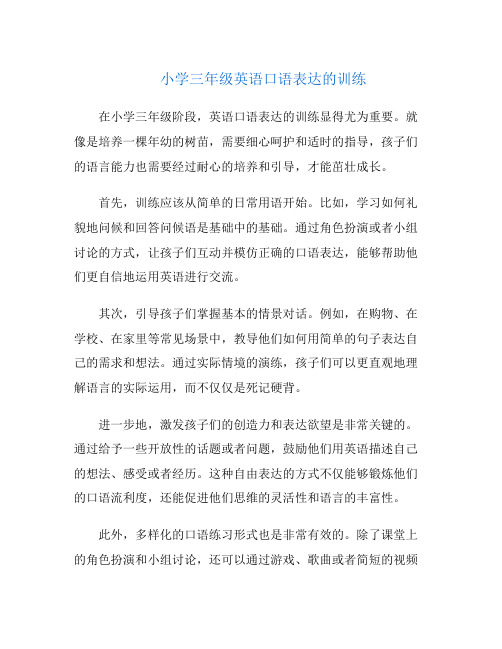
小学三年级英语口语表达的训练在小学三年级阶段,英语口语表达的训练显得尤为重要。
就像是培养一棵年幼的树苗,需要细心呵护和适时的指导,孩子们的语言能力也需要经过耐心的培养和引导,才能茁壮成长。
首先,训练应该从简单的日常用语开始。
比如,学习如何礼貌地问候和回答问候语是基础中的基础。
通过角色扮演或者小组讨论的方式,让孩子们互动并模仿正确的口语表达,能够帮助他们更自信地运用英语进行交流。
其次,引导孩子们掌握基本的情景对话。
例如,在购物、在学校、在家里等常见场景中,教导他们如何用简单的句子表达自己的需求和想法。
通过实际情境的演练,孩子们可以更直观地理解语言的实际运用,而不仅仅是死记硬背。
进一步地,激发孩子们的创造力和表达欲望是非常关键的。
通过给予一些开放性的话题或者问题,鼓励他们用英语描述自己的想法、感受或者经历。
这种自由表达的方式不仅能够锻炼他们的口语流利度,还能促进他们思维的灵活性和语言的丰富性。
此外,多样化的口语练习形式也是非常有效的。
除了课堂上的角色扮演和小组讨论,还可以通过游戏、歌曲或者简短的视频来增加孩子们对英语学习的兴趣和参与度。
例如,设计一些有趣的口语挑战,让他们在竞争中学习、交流和成长。
最后,持之以恒的实践和反馈是保证口语训练效果的关键。
老师和家长应该定期与孩子们进行口语对话,及时指出他们的表达中可能存在的错误或者不足,并给予积极的鼓励和建议。
通过反复练习和不断改进,孩子们的英语口语能力将会逐步提升,从而为他们未来更高级别的语言学习打下坚实的基础。
总之,小学三年级的英语口语训练不仅仅是语言技能的培养,更是综合能力的全面提升。
通过有序而富有趣味性的训练活动,孩子们可以在轻松愉快的氛围中,逐步提升自己的口语表达能力,为未来的学习和生活奠定坚实的基础。
简单英语日常交流口语对话小学
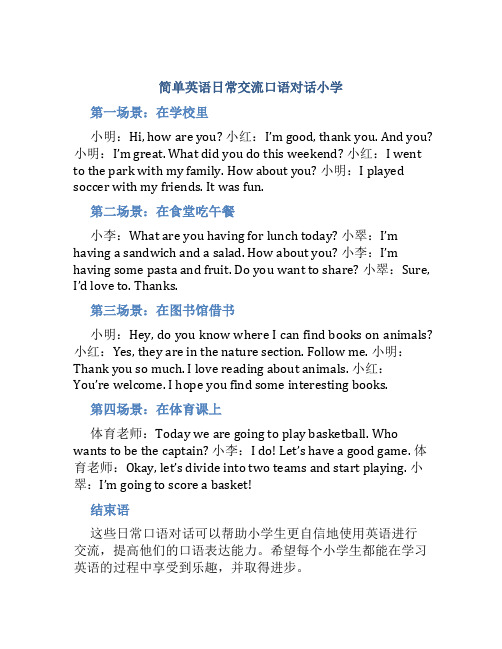
简单英语日常交流口语对话小学第一场景:在学校里小明:Hi, how are you? 小红:I’m good, thank you. And you? 小明:I’m great. What did you do this weekend? 小红:I went to the park with my family. How about you? 小明:I played soccer with my friends. It was fun.第二场景:在食堂吃午餐小李:What are you having for lunch today? 小翠:I’m having a sandwich and a salad. How about you? 小李:I’m having some pasta and fruit. Do you want to share? 小翠:Sure, I’d love to. Thanks.第三场景:在图书馆借书小明:Hey, do you know where I can find books on animals? 小红:Yes, they are in the nature section. Follow me. 小明:Thank you so much. I love reading about animals. 小红:You’re welcome. I hope you find some interesting books.第四场景:在体育课上体育老师:Today we are going to play basketball. Who wants to be the captain? 小李:I do! Let’s have a good game. 体育老师:Okay, let’s divide into two teams and start playing. 小翠:I’m going to score a basket!结束语这些日常口语对话可以帮助小学生更自信地使用英语进行交流,提高他们的口语表达能力。
小学生英语对话练习
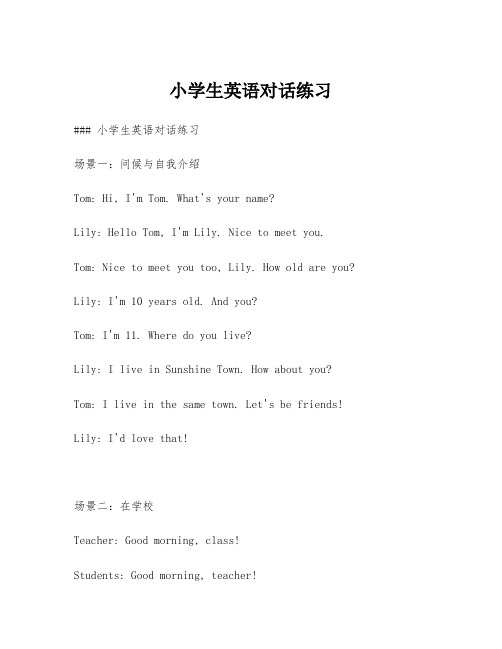
小学生英语对话练习### 小学生英语对话练习场景一:问候与自我介绍Tom: Hi, I'm Tom. What's your name?Lily: Hello Tom, I'm Lily. Nice to meet you. Tom: Nice to meet you too, Lily. How old are you? Lily: I'm 10 years old. And you?Tom: I'm 11. Where do you live?Lily: I live in Sunshine Town. How about you? Tom: I live in the same town. Let's be friends! Lily: I'd love that!场景二:在学校Teacher: Good morning, class!Students: Good morning, teacher!Teacher: What did you do over the weekend?Amy: I went to the library and read some books.Ben: I played football with my friends.Teacher: That sounds fun. Let's start our lesson now.场景三:在公园Sam: Look, there are so many flowers in the park! Jenny: Yes, they are beautiful. I like the red ones best. Sam: Me too. What's your favorite animal?Jenny: I love elephants. They are big and gentle.Sam: I like lions. They are the kings of the jungle.场景四:在超市Mom: Let's buy some fruits. Do you like apples?Kid: Yes, I do. Can we also get some oranges?Mom: Sure, but let's not forget the vegetables.Kid: I don't like vegetables. They taste yucky.Mom: But they are good for you. We need to eat healthy.场景五:在家中Dad: It's time for dinner. Wash your hands.Child: Okay, Dad. What's for dinner?Dad: We're having chicken and rice.Child: Yummy! I'm hungry.Dad: Let's say grace before we eat.Child: Thank you for the food we're about to receive...通过这些对话练习,小学生可以学习到基本的英语交流技巧,包括问候、自我介绍、谈论日常活动、在学校的互动、在公园的对话、超市购物时的交流以及家庭生活中的简单对话。
小学英语日常对话场景练习
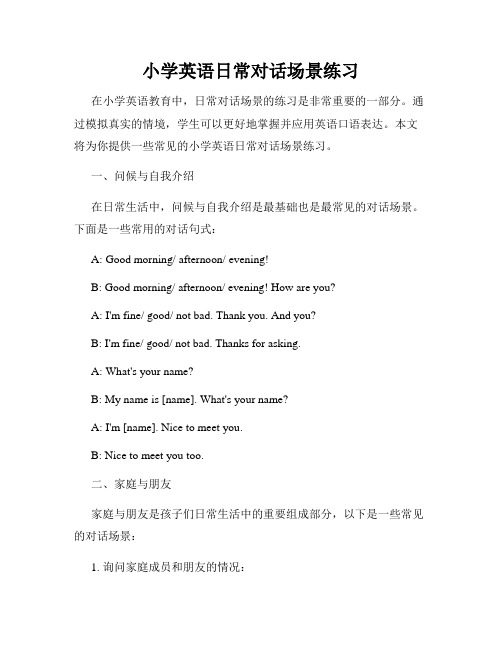
小学英语日常对话场景练习在小学英语教育中,日常对话场景的练习是非常重要的一部分。
通过模拟真实的情境,学生可以更好地掌握并应用英语口语表达。
本文将为你提供一些常见的小学英语日常对话场景练习。
一、问候与自我介绍在日常生活中,问候与自我介绍是最基础也是最常见的对话场景。
下面是一些常用的对话句式:A: Good morning/ afternoon/ evening!B: Good morning/ afternoon/ evening! How are you?A: I'm fine/ good/ not bad. Thank you. And you?B: I'm fine/ good/ not bad. Thanks for asking.A: What's your name?B: My name is [name]. What's your name?A: I'm [name]. Nice to meet you.B: Nice to meet you too.二、家庭与朋友家庭与朋友是孩子们日常生活中的重要组成部分,以下是一些常见的对话场景:1. 询问家庭成员和朋友的情况:A: How many people are there in your family?B: There are [number] people in my family. My mother, father, sisterand me.2. 描述家庭成员和朋友:A: What does your mother look like?B: She has long hair and big eyes. She is beautiful.3. 邀请朋友去玩:A: Would you like to come to my house and play?B: Sure, I'd love to. What time?A: How about Saturday afternoon?B: That sounds great!三、学校生活学校是小学生们日常生活的重要场景,以下是一些常见的对话场景:1. 询问上学和下学时间:A: What time do you go to school in the morning?B: I go to school at 8 o'clock.A: What time do you finish school in the afternoon?B: I finish school at 3 o'clock.2. 讨论上课科目:A: What's your favorite subject?B: My favorite subject is English. What about you?A: My favorite subject is Math.3. 请求帮助:A: Can you help me with my homework?B: Of course. What do you need help with?A: I don't understand this math problem.B: Let me explain it to you.四、购物场景购物是日常生活中不可避免的一部分,以下是一些常见的对话场景:1. 询问商品价格:A: How much is this T-shirt?B: It's 20 dollars.A: Can I get a discount?B: Sorry, it's a fixed price.2. 询问衣服尺码:A: Excuse me, do you have this dress in size S?B: Yes, we do. Let me check for you.3. 询问衣服颜色:A: Do you have this jacket in blue?B: I'm sorry, we only have it in black and white.五、餐厅用餐用餐是人们日常生活中的重要部分,以下是一些常见的对话场景:1. 餐厅预定:A: Hello, do you have a reservation?B: Yes, under the name of [name].2. 点菜:A: What would you like to order?B: I'll have a bowl of noodle soup and a glass of orange juice, please.3. 付账:A: Can I have the bill, please?B: Sure, here you go.以上是一些常见的小学英语日常对话练习场景,通过这些场景的模拟对话,孩子们可以提高他们的英语口语能力,并且更好地应用于实际生活中。
小学英语口语二年级情境对话练习

小学英语口语二年级情境对话练习1. 在家庭聚餐中:Family DinnerJames: Mom, can I have some more rice?妈妈,我可以再要一些米饭吗?Mom: Sure, here you go.当然可以,给你。
Emma: Dad, may I have some more vegetables please?爸爸,我可以再要一些蔬菜吗?Dad: Of course, here you are.当然可以,给你。
2. 在学校图书馆:In the School LibraryCindy: Excuse me, do you have any books about dinosaurs?打扰一下,你们有关于恐龙的书吗?Librarian: Yes, we have a wide range of books on dinosaurs. Let me show you the section.是的,我们有很多关于恐龙的书籍。
让我带你去那个区域。
Cindy: Thank you, that would be great!谢谢你,那太好了!3. 在课堂上:In the ClassroomTeacher: Good morning, class. Let's practice some English dialogues today. Sarah, would you like to start?同学们,早上好。
今天我们练习一些英语对话。
Sarah,你愿意开始吗?Sarah: Yes, of course. Can I ask Emma to be my partner?是的,当然可以。
我可以请Emma做我的搭档吗?Teacher: Of course, you may work in pairs.当然可以,你们可以成对练习。
4. 在商店购物:Shopping at the StoreCustomer: Excuse me, where can I find the children's shoes?打扰一下,我应该在哪里找到儿童鞋?Shop Assistant: They are located on the second floor, in the children's section.它们位于二楼的儿童区。
三年级英语综合练习情景对话练习

三年级英语综合练习情景对话练习学校名称:班级:学号:姓名:1.根据所给情景对话,选择正确的答案。
( ) 1. 格林老师请你开门,他说:A. Open the door, please.B. Close the door, please.C. Close the window, please.( ) 2. 你做错了事,应该对别人说:A. OK.B. Thank you.C. I’m sorry.( ) 3. 上课了,同学们起立后,老师对大家说:A. Stand up.B. Sit down.C. Yes, please.( ) 4. 外面刮风了,妈妈对你说:A. Please open the window.B. Please open the door.C. Please close the window.( ) 5.下午老师上课时,不可以说:A. Hello , class.B. Good morning, class.C. Good afternoon, class.( ) 6.你想问别人是否想要吃冰淇淋时,应该怎么说:A. What about an cake?B. Would you like an ice cream?C. No, thank you.( ) 7.上课时,老师请大家看黑板时,应该怎么说:A. Listen to the teacher, please.B. Don’t look at the blackboard.C. Look at the blackboard.( ) 8.你告诉别人这不是你的书包时,你可以说:A. This is my schoolbag.B. This isn’t my schoolbag.C. That isn’t my schoolbag.2.从Ⅱ栏中找出与Ⅰ栏相对应的答句,将其序号填在题前括号内。
ⅠⅡ( ) 1.What colour is the window ? A. Sit down , please.( ) 2. Stand up , please . B. It’s a robot .( ) 3.What’s this ? C. Good morning .( ) 4.Good morning . D. OK, Miss Li .( ) 5.Don’t open the book . E. It’s yellow .3.你知道在下列情景中该用什么交际用语吗?把序号填在括号内。
译林小学英语四年级上册口语表达训练
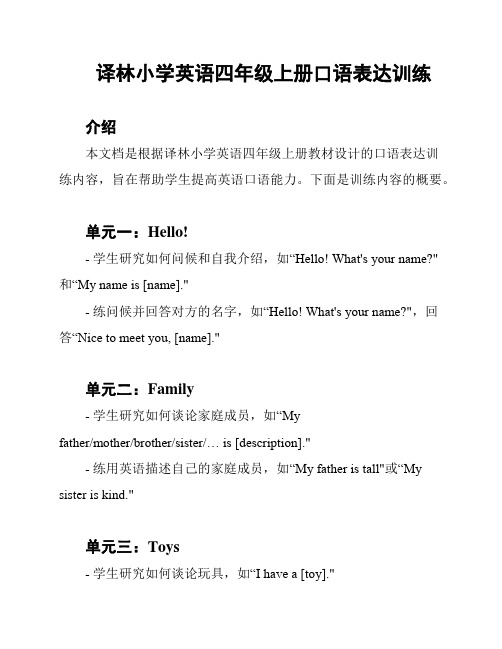
译林小学英语四年级上册口语表达训练介绍本文档是根据译林小学英语四年级上册教材设计的口语表达训练内容,旨在帮助学生提高英语口语能力。
下面是训练内容的概要。
单元一:Hello!- 学生研究如何问候和自我介绍,如“Hello! What's your name?"和“My name is [name]."- 练问候并回答对方的名字,如“Hello! What's your name?",回答“Nice to meet you, [name]."单元二:Family- 学生研究如何谈论家庭成员,如“Myfather/mother/brother/sister/… is [description]."- 练用英语描述自己的家庭成员,如“My father is tall"或“My sister is kind."单元三:Toys- 学生研究如何谈论玩具,如“I have a [toy]."- 练用英语描述自己拥有的玩具,如“I have a toy car"或“I have a doll."单元四:Actions- 学生研究如何表达动作,如“I can [action]."或“He/She can [action]."- 练用英语描述自己和他人的动作,如“I can swim"或“He can run fast."单元五:Food and Drinks- 学生研究如何谈论食物和饮品,如“I like [food]."或“I don't like [food]."- 练用英语描述自己对食物和饮品的喜好,如“I like apples"或“I don't like vegetables."单元六:School Days- 学生研究如何谈论学校生活,如“I have [subject] on [day]."- 练用英语描述自己的学校生活,如“I have English on Monday"或“I have Math on Wednesday."单元七:Months and Weather- 学生研究如何谈论月份和天气,如“It's [month]."或“It's [weather]."- 练用英语描述不同月份和天气,如“It's January"或“It's sunny."单元八:Holidays- 学生研究如何谈论假期和庆祝活动,如“I celebrate [holiday]."或“I have [activity] on [holiday]."- 练用英语描述自己的假期和庆祝活动,如“I celebrate Christmas"或“I have a picnic on Labor Day."总结本文档涵盖了译林小学英语四年级上册的口语表达训练内容,包括问候、家庭、玩具、动作、食物、学校生活、月份和天气以及假期等方面的练。
小学英语简单对话练习
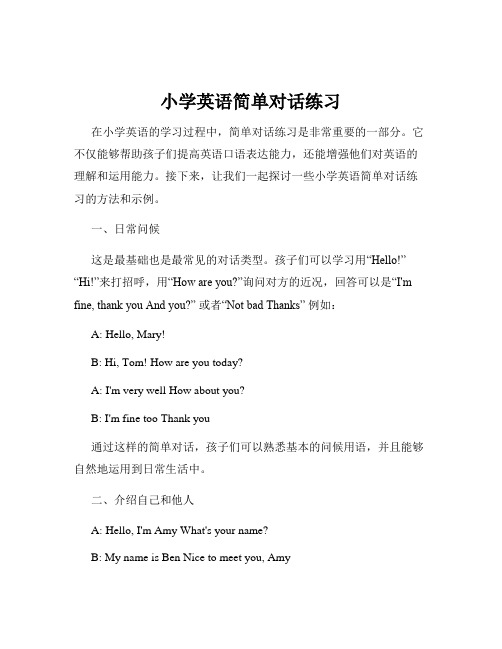
小学英语简单对话练习在小学英语的学习过程中,简单对话练习是非常重要的一部分。
它不仅能够帮助孩子们提高英语口语表达能力,还能增强他们对英语的理解和运用能力。
接下来,让我们一起探讨一些小学英语简单对话练习的方法和示例。
一、日常问候这是最基础也是最常见的对话类型。
孩子们可以学习用“Hello!” “Hi!”来打招呼,用“How are you?”询问对方的近况,回答可以是“I'm fine, thank you And you?” 或者“Not bad Thanks” 例如:A: Hello, Mary!B: Hi, Tom! How are you today?A: I'm very well How about you?B: I'm fine too Thank you通过这样的简单对话,孩子们可以熟悉基本的问候用语,并且能够自然地运用到日常生活中。
二、介绍自己和他人A: Hello, I'm Amy What's your name?B: My name is Ben Nice to meet you, AmyA: Nice to meet you too This is my sister, LucyB: Hello, Lucy这样的对话练习可以让孩子们在交流中清晰地表达自己和介绍身边的人。
三、询问物品在日常生活中,孩子们经常会对周围的物品感到好奇,这时候就需要学会用英语询问。
比如用“What's this?” “What are those?” 回答可以是“It's a pen” “They are books” 看下面的对话:A: What's this in your hand?B: It's an eraserA: And what are those on the desk?B: They are rulers通过这样的练习,孩子们能够学会用英语描述和询问身边的物品。
小学英语口语对话练习可修改全文

可编辑修改精选全文完整版
小学英语口语对话练习
小学英语口语对话练习
为了走上成材的道路,钢铁决不惋惜璀璨的.钢花被遗弃。
以下是店铺为大家搜索整理的小学英语口语练习,希望能给大家带来帮助,part 1
I love little pussy
我爱小猫咪
Her coat is so warm
它的毛皮如此温暖
And if I don't hurt her
如果我不伤害它
She'll do me no harm
它也不会伤害我
So I'll not pull her tail
所以我从不拉它尾巴
Nor drive her away
也不赶它离开
But pussy and I
猫咪和我
Very gently will play
快乐的在一起玩儿
part 2
I See the Moon
我看到月亮
I see the moon
我看到月亮
And the moon sees me
月亮也能看到我
God bless the moon 上帝保佑月亮
And God bless me 上帝也会保佑我。
- 1、下载文档前请自行甄别文档内容的完整性,平台不提供额外的编辑、内容补充、找答案等附加服务。
- 2、"仅部分预览"的文档,不可在线预览部分如存在完整性等问题,可反馈申请退款(可完整预览的文档不适用该条件!)。
- 3、如文档侵犯您的权益,请联系客服反馈,我们会尽快为您处理(人工客服工作时间:9:00-18:30)。
小学英语课堂中的说话写话训练刍议
一、让学生在活动中说写
牛津小学英语6b教案——unit 6 planning for the weekend第一课时的教学要求是1.能听懂、会说、会读和会拼写单词picnic,play, take part in…2.掌握会话中出现的三会单词concert,outing,beijing opera show,singing contest,sports meeting.3.能初步运用所学的词汇进行交流what are you going to do…?we’re going to…我在课堂中第二个环节是这样安排的:
1.用课件播放有关周末活动的动画,让学生对教学内容有感性的认识。
然后拿出一些关于周末活动的图片(可使用b部分的教学图片),老师通过在黑板上贴图的方式创设情境,向学生介绍周末活动。
t: here are some pictures of some weekend activities. look at them carefully. what are they doing?what is he/she doing?
2.让学生在小组中自学picnic,play,take part in…,concert,outing,beijing opera show,singing contest,sports meeting…,然后搞一个“little teacher”活动,使学生获得成就感,然后让其他学生参与评价,老师通过个人说、集体说、小组说、开火车说等形式,检查学生的掌握情况,最后给予总结。
在练习和巩固阶段又这样安排:1.活动:look and act——教师和学生说出词组,其余学生用动作表示。
2.游戏:look and guess ——教师或学生做某一动作,全班学生竞猜what are you going to do?或who is going to…?
通过播放动画、欣赏图片及“little teacher”等活动学习、记忆单词,这样不仅不会让学生感到疲劳,还让学生在很好的氛围中学习英语单词。
而后以游戏的形式进行巩固,有效地进行了知识的产出,绝大多数学生反馈不错。
二、让学生在生活中学会说写
在4b unit7 parta教学中我们是这样设计的:step1: warming up and revision
1. free talk
t: good morning,boys and girls .
nice to meet you.
who’s that girl with…?
how old are you?
how old is he /she?
what do you want to be?
how are you?
(由对身体情况的问,引出i’m not so good. i’m hungry.
从而引出食物类单词)
2. review the words
t:what’s this ?
ss:it’s a hot dog.
t:what’s that?
…
t: i’m thirsty,too.you can say…
ss:something to drink?
(复习学过的食物类饮品类单词,引出句型something to drink?)
3. play a game
t: i’m the waitress now. what would you like?
s1: i’d like a hot dog.
t: anything else?
s1:no,thank you.
t: how about you?
s2: i’d like some bread.
…
(引出句型what would you like? how about you?anything else?进行操练)
在这节课里,背景为快餐店,主要教学dad问su yang, su hai 各自需要什么食品和饮料,接着又在服务生的询问下为自己点了一杯咖啡,最后付款。
对话中出现了新句型:how about you?something to drink? anything else?本课出现的一个重要的句型:what would you like?学生在三年级的时候就已经学过了。
新句型 how about you?something to drink?anything else?的教学能在较真实的语境中引出。
在学生们操练表演前,对课文,对学生在此种环境下要用的语言进行了有效的小结。
三、学会蹲下身来评价学生的说写
对于学生评价要及时,多鼓励,奖励小红花,在写话练习中,多圈画一些好的句子,让学生获得成功的写作体验。
教师也要注意做足“平日工夫”来促进学生的写作。
所谓“平日工夫”是指背诵名篇、佳作,指导学生多阅读;写好读书笔记,定期进行交流,教师要进行适时点评;鼓励学生与说英语国家的中学做笔友或利用
bbs 、qq在网上交流。
只有通过写作,进行充分的信息加工,理解了词与词,句与句之间真正的内涵及其内部结构,才能把英语知识转化为技能,将技能转化为写作能力。
通过采取教师评价、自我评价和小组评价等多种评价方法交互进行的方式,每个学生都能参与评价过程,把评价变成学生与教师对话、与自己对话、与同伴对话的过程,让学生深入了解教师对自己学习以及能力发展的看法,深刻认识和反省自己学习情况,或进一步在同伴的学习过程与发展中进行思考。
在这样的评价中,学生体验到的是作为独立主体与他人的相交相融。
在此过程中,学生全体验到自尊、交流、信任的快乐,会逐渐认识到这是一个促进自我完善的过程,因而会正确对待并积极开展自己所参与的评价活动。
